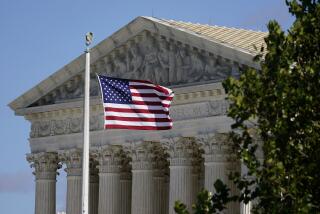Tax Protesters Cannot Be Jailed if Beliefs Are Sincere : High court: Even irrational ideas are protected, justices rule. Violators still subject to monetary penalties.
- Share via
WASHINGTON — The Supreme Court made it harder Tuesday for the government to punish tax protesters, ruling that a person who sincerely believes he is exempt from tax laws may not be jailed for a criminal tax violation.
Even if those beliefs are irrational, it is up to a jury to decide whether they are sincere or phony, the court said in a 6-2 ruling.
The case involved a college-educated airline pilot who stopped paying taxes in 1980 after attending an anti-tax seminar. He said he believed seminar leaders who contended that wages only compensate employees for work performed and thus are not truly “income.”
The decision does not affect fines and penalties commonly levied against a taxpayer who fails to pay the correct amount of taxes. Rather, the case concerned the standards for criminally prosecuting a person for “willfully” violating the tax laws.
The two dissenters, both liberals, accused the majority of falling for a phony defense. It goes “beyond the limits of common sense” to believe that any taxpayer could honestly think he could earn $80,000 a year and owe no taxes, they said.
The dissenters said also that they fear the ruling will encourage the “cult” of tax protesters.
However, lawyers for the Internal Revenue Service called the decision only a minor setback. In most jurisdictions, federal prosecutors have been required to prove that a tax protester understood that he was intentionally violating the law, they said.
The court noted that a mere disagreement with the tax laws, or a general belief that taxes are unconstitutional, is not grounds for escaping punishment.
Typically, the IRS pursues tax evaders by getting civil court orders forcing them to pay back taxes and penalties. In 1989, the IRS said that it audited nearly 1 million tax returns and assessed extra taxes and penalties on 837,423 taxpayers. Only 171 persons were criminally prosecuted and convicted for tax protests.
“We go after the most egregious situations where there is a clear intent to evade the law,” IRS spokesman Wilson Fadley said.
Usually, ignorance of the law is not a defense to a criminal charge. But, because the tax code can be numbingly complicated, Congress has said that a person may be sent to prison only for a willful or intentional violation of the tax laws.
John L. Cheek, a veteran American Airlines pilot, clearly intended not to pay his taxes but said he was convinced by seminar leaders that he was exempt from taxation.
“It may seem silly to you and me, but he believed it,” said Chicago attorney William Coulson, who represented Cheek in the Supreme Court.
From 1980 to 1986, Cheek did not file tax returns and also sought refunds for money that had been withheld from his paycheck. His annual salary during those years ranged from $50,000 to $83,000.
U.S. attorneys decided to prosecute him for criminal tax evasion. During his trial, Cheek represented himself and convinced several jurors that his beliefs were sincere.
When the jury appeared deadlocked, the trial judge told the panel that “an unreasonable belief is not a defense” to willfully violating tax laws. Based on that advice, the jury found Cheek guilty, and he was sentenced to one year in prison.
But the Supreme Court said that the judge erred and Cheek is entitled to a new trial in the case (Cheek vs. U.S., 89-658).
It does not matter whether the taxpayer’s belief is reasonable or not, said Justice Byron R. White. If the jury believes a taxpayer had a “good-faith misunderstanding” about his tax obligations, he may not be found guilty of a willful tax violation.
In his dissent, Justice Harry A. Blackmun wrote: “It is incomprehensible to me how, in this day, more than 70 years after the institution of our present federal income tax system, (that) any taxpayer of competent mentality can assert as his defense . . . the proposition that the wage he receives for his labor is not income.” Blackmun was joined by Thurgood Marshall.
Coulson, Cheek’s attorney, served for 13 years as a federal prosecutor in Chicago.
“We used to go after a few tax protesters every year who had made clear they were not going to pay their taxes,” he said.
Cheek’s case was different, he said, because the airline pilot believed what he was doing was legitimate.
More to Read
Inside the business of entertainment
The Wide Shot brings you news, analysis and insights on everything from streaming wars to production — and what it all means for the future.
You may occasionally receive promotional content from the Los Angeles Times.











